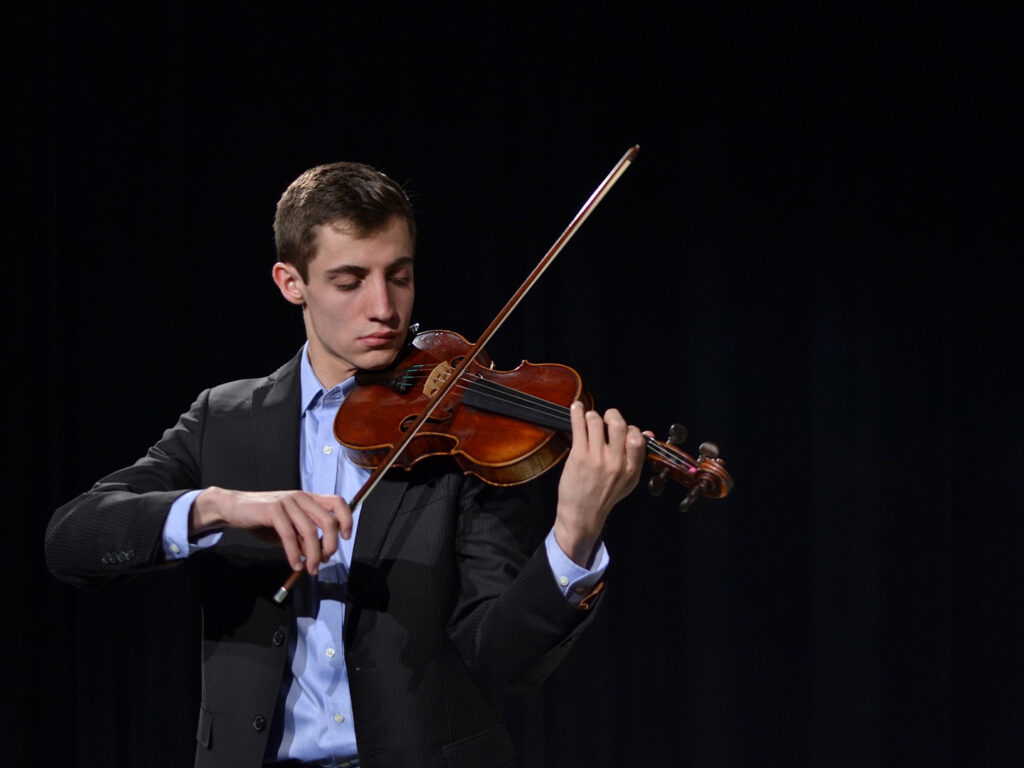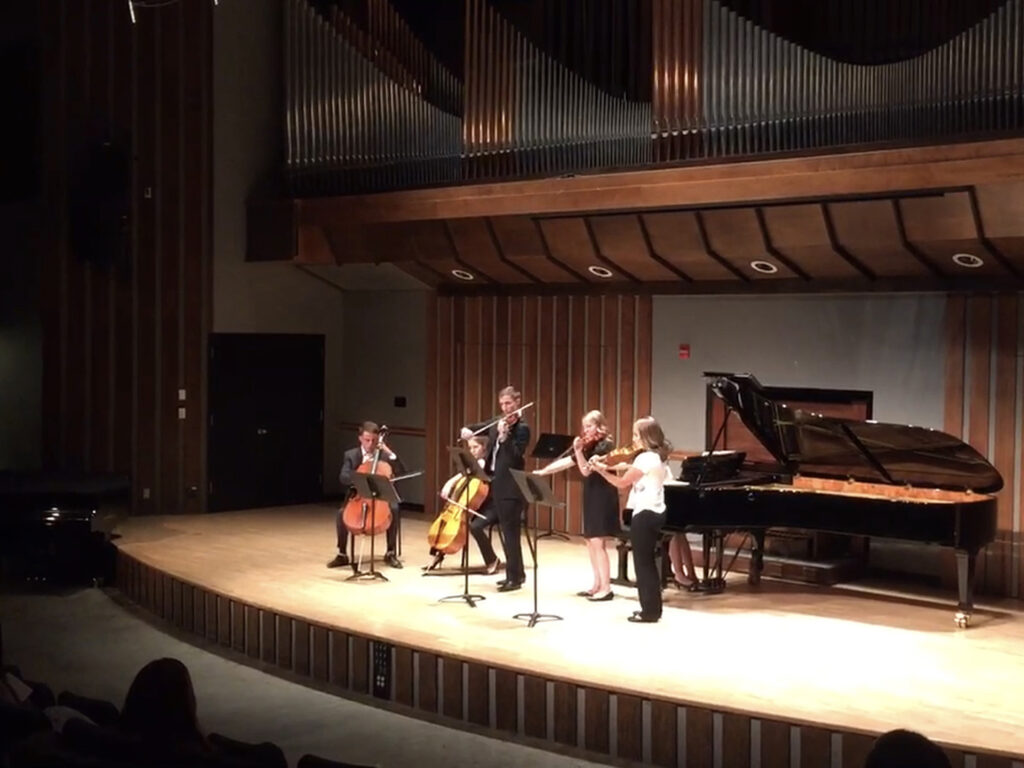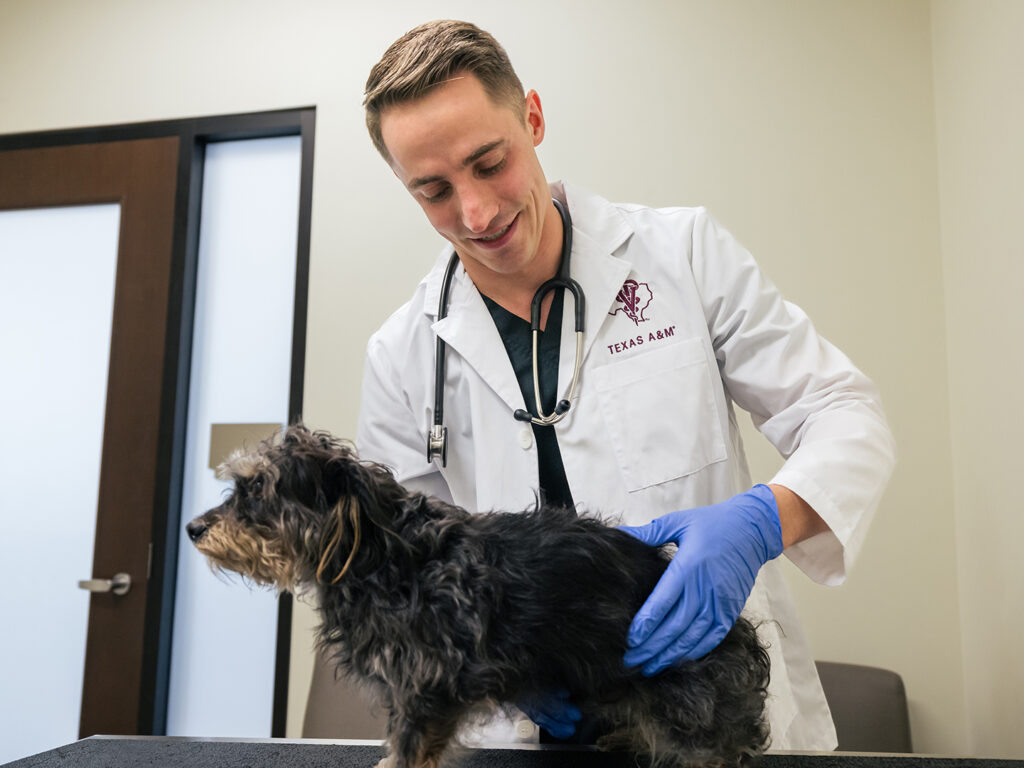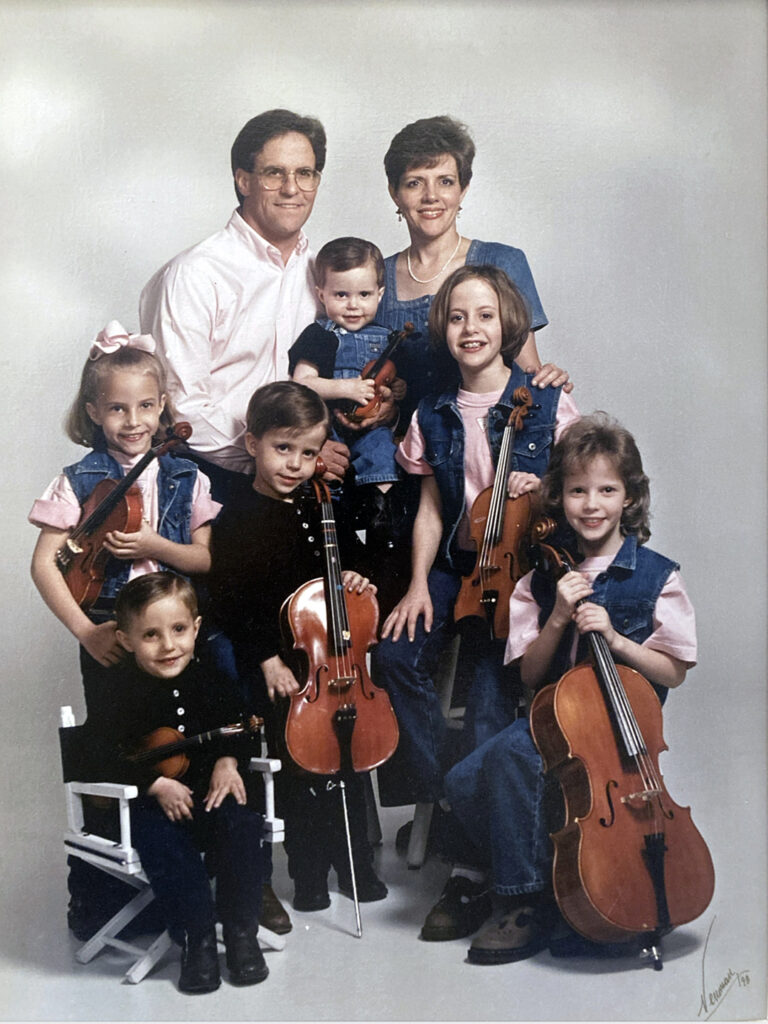The Violinist Veterinarian: Texas A&M Veterinary Student Combines Passions For Music, Animals
Story by Ashley Vargo

Between music and medicine, violinist and Texas A&M School of Veterinary Medicine & Biomedical Sciences (VMBS) fourth-year veterinary student Doug Ferry has always done more than just measure up.
While growing up on a ranch in the small town of Corinne, Utah, Ferry and his six siblings were expected to learn a musical instrument. It was more than an expectation — it was tradition.
“My mom is a musician who comes from a very musical family,” Ferry said. “Her mother was a well-respected piano teacher for many years and raised all of her children as musicians. All of my aunts and uncles on that side were instrumentalists of some sort, whether it was brass, wind, piano, or strings.”
Ferry’s mother decided to carry on the tradition with her own children, who began their instruction at the ages of 2 or 3. Each had a principal instrument — either violin or cello; all were also raised as vocalists and pianists, with their grandmother providing piano instruction.
“It was basically a part of our family culture,” Ferry said. “We would perform together a lot.”
The Ferry family’s musical gifts blessed many in their agricultural community. They became known as the Ferry Family Fiddlers, or the Ferry Family Strings, and performed at weddings, charity fundraisers, nursing homes, and more.
“People would hear us and say, ‘Oh, it sounds so good. I’d love to hear you rehearse at home,’ and we were like, ‘You do not want that,’” Ferry joked. “We were all driven and opinionated individuals and rehearsing was, at times, somewhat colorful.”
While music was something to both fight over and bond over, Ferry said that some of his best memories are centered around music and performances with his family.
A Veterinary Overture

After becoming an award-winning violinist on state and international levels, Ferry pursued a degree at Brigham Young University as one of 10 freshmen violinists accepted into its Bachelor of Music program. However, after serving for two years as a full-time missionary for The Church of Jesus Christ of Latter-day Saints, he decided to switch his degree to a Bachelor of Arts in music, with a minor in business, so that he could incorporate pre-veterinary coursework into his undergraduate studies.
“After coming back from the mission, I needed to make a decision as to where I was going to go and what I was going to pursue professionally,” he said. “It was a challenging decision. I was leaning toward being a professional musician, but I thought about other professions as well. I explored marketing, orthodontics, dentistry, law school, and being a violin professor, but the profession that felt the very best in my heart was veterinary medicine.”
After coming to the VMBS, Doug came to enjoy the focus of a single program, despite the range of content in the veterinary curriculum.
Although the beginning of his veterinary school career coincided with a time of personal difficulty, Ferry quickly found strength in the Aggie community, especially within the veterinary Class of 2024.
“When I got here, I didn’t really feel like getting out of my shell and connecting with other people,” he said. “But I decided to overcome that fear and be intentional about connecting with others and developing friendships.
“I’ve been blown away by how kind and accepting and genuine my classmates have been,” he said. “It has made for a really memorable experience to know that I have over 150 great friends. And I don’t say that lightly; every single person in our class has been so good to me, and that has been a really fulfilling experience.”
Medicine And Music

Photo by Jason Nitsch ’14, School of Veterinary Medicine & Biomedical Sciences
Despite the rigor of veterinary school and his leadership responsibilities as the Class of 2024 president, Ferry has made sure to incorporate music into his busy routine.
Throughout all four years of veterinary school, he maintained a private violin studio, which he used to teach classical violin to youth in the Bryan-College Station community. Teaching violin is one of his favorite things and has been a meaningful way to pay forward the gift of music he received, Ferry said.
Additionally, he performed as a guest violinist and vocalist at the VMBS’ Coffee, Culture, & Conversations events that showcase student, faculty, and staff artistic talent.
“There is nothing that can replace the impact that music has on us as people,” he said. “It is a medium through which I have experienced a lot of healing, and other people experience that as well. It is very exciting. It is a great way to express yourself.”
Along with the restorative benefits, Ferry has found plenty of crossover between the skills he needs as a veterinarian and those he employs as a violinist.
“The first skills you develop as a musician are the resilience and discipline to stick to a task until it sticks to you and to have in mind what you want to create and then work toward your end result,” Ferry said. “A lot of those principles apply to veterinary medicine. You need that to be able to, across weeks and weeks of exams, have the end goal in mind of being a veterinarian, of being able to make an impact in the lives of others and in the community.”
Music As Therapy

After graduation, Ferry plans to enter into small animal general practice and, eventually, work on creating a hospital system where the experience of the clients, employees, and animals involved is mastered.
He also hopes to explore more of the connections between music and veterinary medicine, including the therapeutic benefits of music and epigenetics, the study of how an individual’s behavior and environment change the way their genes work.
According to researchers, music may have therapeutic benefits because of sound frequencies interacting with the genes in an individual’s DNA. Theoretically, the frequencies influence the way genes activate or deactivate, causing different gene expressions through a process called tagging.
“It’s interesting to consider the long-term effects that epigenetic tagging might have on the well-being of a mammal,” Ferry said. “It would be really cool to determine if there are specific combinations of frequencies that positively influence the epigenome of, say, a dog, and create those sounds so that animals get a dose of ‘music therapy.’”
Composing A Veterinary Career
No matter where his veterinary future takes him, Ferry is sure that music will always be a large part of his life. He aims to continue sharing the healing and enriching power of music with others — both people and pets.
“One of the most important parts of treating animals is ensuring they experience minimal stress and anxiety,” Ferry said. “Music has been so healing and strengthening for me, and I hope to incorporate that in the clinical setting for a pet.
“I’ve had the vision of creating a hospital system that strikes the balance between the resources of a large corporate entity but also maintains the culture and community of a smaller practice,” he said. “I want the hospital setting to be where my colleagues can really practice their art as wonderful physicians while enjoying a beautiful, balanced life.”
###
Note: This story originally appeared in the Fall 2023 issue of VMBS Today.
For more information about the Texas A&M School of Veterinary Medicine & Biomedical Sciences, please visit our website at vetmed.tamu.edu or join us on Facebook, Instagram, and Twitter.
Contact Information: Jennifer Gauntt, Director of VMBS Communications, Texas A&M School of Veterinary Medicine & Biomedical Sciences; jgauntt@cvm.tamu.edu; 979-862-4216


